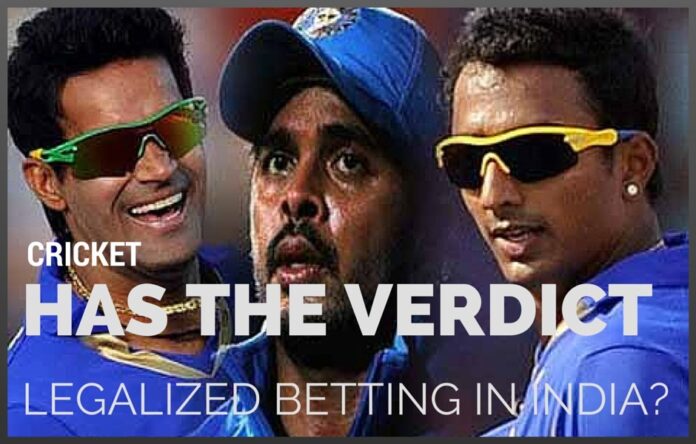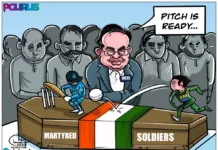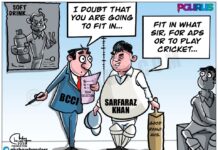
Navin Upadhyay
New Delhi
Shoddy probe, infirm laws gave tainted players escape route from the trial court ruling:
In more recent times match fixing and betting in cricket and in IPL matches has become the newspaper headlines. Delhi Police has estimated that in one IPL match the total bets would be around Rs.150 crores ($23.42 million). A staggering figure of Rs.2469,99,08,750 ($38.6 billion) has Been estimated as illegal money, generated through betting on matches played between 04.12.2014 till 19.03.2015 by the Enforcement Department in the charge sheet submitted under Money Laundering Act, in Gujarat.
The clean chit given by a Delhi trial court to three top notch cricketers — S Sreesanth, Ankeet Chavan and Ajit Chandila in the IPL 2013 spot fixing case, has exposed both the limitations of the Police probe and existing laws to deal with the menace of betting. A study of the Court judgment clearly shows that if the probe was conducted by a professional agency, and if the players were booked under proper provision of laws, they would not have got away so easily after being caught red-handed…
The Delhi police’s handling of the case has shown how ill-equipped it is to deal with any case where it has to go beyond “third degree” to pin down the culprits. The court squarely rejected the application of Maharashtra Control of Organized Crime Act (MCOCA) against the three players because at least two First Information Reports (FIRs) had not been filed against them or any other accrued in the preceding ten years — a pre-requisite for invoking the stringent provisions of the Act. It is shocking that police did not even know this much. In addition, it also failed to meet other criteria for charging an accused under the MCOCA. Once the very fabric of the case of the prosecution collapsed, the rest was logical.
The police started with what seemed like a watertight case based on interception of telephonic conversation between players, bookies and members of the Dubai-based criminal syndicates. The Court in its judgment has referred to these evidences, which the police collected before it cracked down on the players.
The involvement of the three players in the betting scandal is sought to be established by three examples: (As per the court order)
- On May 05, 2013, a match was played between Rajasthan Royals and Pune Warriors at Sawai Maan Singh Stadium, Jaipur from 2000 hours onwards. The intercepted calls revealed that Ajit Chandila had a conversation with Amit Singh who directed him to give away 14+ runs before the second over of his bowling spell, after giving a predecided signal. Ajit bowled first over and gave nine runs. In the second over, Chandila gave away 14 runs but forgot to give pre-decided signal to the fixer accused Manan which made accused Chandresh Patel upset as they could not book the session, which was fixed for gains.
- Likewise, Sreesanth of Rajasthan Royals was found to have been fixed by Chandresh and Manan through his friend Jiju for delivery of a fixed performance in the match scheduled for 09.05.2013 between Rajasthan Royals and Kings XI Punjab at Mohali (Punjab), in lieu of huge amount of money. Amit was found to be a prime facilitator of the team. Sreesanth gave a pre determined signal by tucking his hand towel in his trouser at the start of the second over and did extended warm up exercises and also made best efforts to give the desired number of runs.
- In the cricket match played between Rajasthan Royals and Mumbai Indian on 15.05.2013, as per the bookies Ankit Chavan give away 14+ runs in the pre decided over. Despite such good “leads,” the police botched up the case, filed chargesheet under wrong provision of laws, and failed to establish what seemed to be prima face a big scandal. In fact, the probe was so shoddy that the police did not even record the statements of the accused under Section 18 of the MCOCA to make them admissible as evidences. Similarly, many of the telephone intercepts were not recorded in compliance with Acts laid down for such recording.
Now comes the second part: The infirmities of the existing laws to deal with such a menace. Gambling or betting have been prohibited by an 146-year-old law – The Public Gambling Act, 1867. However, Section 12 of the Act has specifically kept certain activities out of its purview. According to this section, the provisions of the Act shall not apply to any game of ‘mere skill wherever played’. The term ‘Gambling’ as such has not been defined in the Public Gambling Act, 1867. However, according to Entry 34 of List II, under the Seventh Schedule to the Indian Constitution:
“Gambling includes any activity or undertaking whose determination is controlled or influenced by chance or accident and an activity or undertaking which is entered into or undertaken with consciousness of the risk of winning or losing, e.g., ‘prize competitions, a wagering contract… where there is no actual transfer of goods but only to pay or receive the difference according to the market price which varies from the contract price.”
– Entry 34 of List II, under the Seventh Schedule to the Indian Constitution
Two precedents were quoted by the court in its judgment:
- S.R Das, Chief Justice in State of Bombay vs. RMD Chmarbangwala AIR 1957 SC 699, to observe that those activities which encourage a spirit of reckless propensity for making easy gain by lot or chance, which leads to loss of hard earned money of the un-discerning and improving common man and thereby, lower his standard of living and desire him into a chronic state of indebtedness and eventually disrupt the peace and happiness of his humble home, could possibly never be intended by Constitution to be raised to the status of trade and commerce or protected as a fundamental right.
Going by the 1867 Act, the court said that in order to be branded as gambling, the competition must be one in which success is dependent entirely on chance. “In order to avoid the stigma of gambling, the competition must involve a substantial degree upon the exercise of skill,” it said.
- The trial court order also referred to Supreme court judgment in the case of Dr. K. R. Lakshmanan vs. State of Tamil Nadu AIR 1996 SC 1153. In that case, referring to the provision of the Public Gambling Act, the SC observed that “while gambling, which rests purely on chance, is held penal, but this Act creates an exception for game of skill. A game of skill was defined as one in which success depends principally upon the superior knowledge, training, attention experience and expertise of the player. It is a game in which element of skill predominates over the element of chance.”
The trial court also replied up on two other judgments in which rummy and horse racing were not judged as gambling activity since they required – in the first case, skill; and in the second, stamina.
Similarly, in the case of Manakady Elainger Nala Sports, Narpane Mandran vs. State of Tamil Nadu 2005 (1) CTC 245, the Madras High Court has declared that playing games like chess and
Carrom even on payment of fees to the clubs, would not amount to gambling under Public Gambling Act as the games are predominantly games of skill.
The trial court said that though there was no judicial verdict in regard to spot of cricket, yet applying the principles laid down in the previous judgments,
“it can be easily noted that cricket is purely a game of skill which required extensive training, practice and expertise and skills in the players. It is not a game of chance but of knowledge, study and practice, which primarily depends on the special ability acquired by training.”
“Cricket as a game of skill requires and eye coordination for throwing, catching and hitting. It requires speed, both during fielding chases and between the stumps. It requires stamina and brute strength to wallop boundaries. It requires microscopic levels of precision and mental alertness for batsmen to find gaps or for bowlers to produce variety of styles of deliveries (medium pace, fast, in swing, out swing, off spin, leg spin, googly). The sport requires strategic masterminds that can select the most efficient fielding positions for piling pressure on the batsmen. Based on above description, cricket cannot be described anything, but as a game of skill.”
“The game of cricket, therefore, cannot be held as a game of chance, but is a game of skill which is exempted under Section 12 of Public Gambling Act, from the definition of Gambling.”
Going by the precedents (quoted above), the trial court said that, “even if it is accepted that there was rampant betting going on in the IPL6, but it is an activity excluded u/s 12 of Public Gambling Act, and is not an offence for which any of the accused can be held liable.”
The Delhi police may go in appeal against the trial court verdict, but the fact remains that infirm laws and shoddy probe give little chance of placing the tainted players back in the docks. The trio may have the last laugh, but they will forever remain “sinners” in the eyes of the cricket lovers.
Summary:
There is strong grounds for a new industry, Online Betting to arise based on this judgment in India. And it might be beneficial to everyone, including the Government, which can collect taxes on the earnings and also curb the alleged menace of counterfeit currency being paid to the winners of the bets.
Note:
1. The conversion rate used in this article is 1 US Dollar = 64.06 Rupees.
- The rise of Patanjali:An Indian yogi’s challenge to MNC giants - January 26, 2016
- Padmas – a blend of excellence, politics and ideology - January 25, 2016
- Scared of hispopularity, British wanted to hang Netaji - January 24, 2016











Why legalize only Gambling? Robbery, prostitution, Corruption,etc. have been there for centuries. Legalize it to increase revenue. Please recall Cho’s Muhammad Bin Tuglak drama/movie where legalization of corruption.